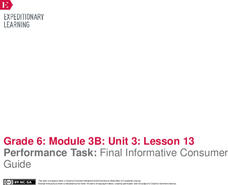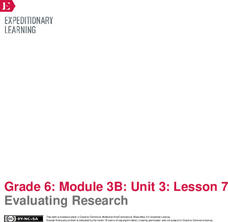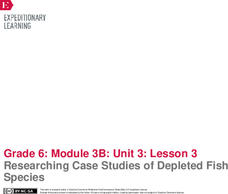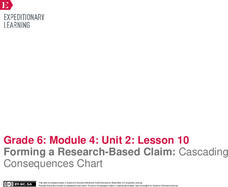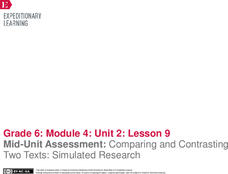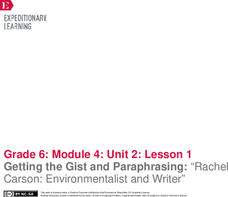Bonneville
The Problem of Plastic Trash Islands
Trash collection can be a hassle, especially out in the ocean. The second of four parts in the Adrift in a Sea of Plastic unit has pupils research plastic trash islands in marine ecosystems. They investigate why they occur and potential...
California Department of Education
My Dream Career
After completing an interest assessment, scholars discover a list of careers that appeal to their interests. They choose one to research and present their findings to their peers.
EngageNY
Performance Task: Final Informative Consumer Guide
Formative feedback should be kind, specific, and helpful. Pupils engage in a peer editing process, using a rubric to critique a partner's writing. Next, scholars use the feedback to create the final version of their informative consumer...
EngageNY
Revising the Informative Consumer Guide: Sentence Structure, Transitions, and Works Cited
Transitions are the glue that link paragraphs together. Pupils listen to a mini lesson plan on sentence structure and transitions and use what they learned to revise their informative consumer guides. Next, they self-assess their writing...
EngageNY
Analyzing the Features of an Informative Consumer Guide
Analyze, strategize, synthesize! Scholars analyze informative consumer guides to determine what features to include in their own guides. Next, pupils select charts and images to use in their guides.
EngageNY
End of Unit Assessment: Drafting the Informative Consumer Guide
Not all sandwiches are edible. Scholars use a Quote Sandwich graphic organizer to draft the written content of their informative consumer guides. Additionally, they view a mini-lesson plan on formal writing.
EngageNY
Planning Content of Informative Consumer Guide: Sustainable Fishing Methods
There's no such thing as over-planning. In preparation for their informative consumer guides, scholars complete a Quote Sandwich graphic organizer to compile their information about sustainable fishing methods. Next, volunteers share...
EngageNY
Planning Content of Informative Consumer Guide: The Issue of Overfishing and Fish Depletion
Let's get organized! Pupils organize the information they have gathered about overfishing into a Quote Sandwich graphic organizer in preparation for their informative consumer guides. Next, they engage in a pair share activity to discuss...
EngageNY
Evaluating Research
Calling all archaeologists! Scholars dig through their research about overfishing, searching for the best information to include in their consumer guides. Next, pupils engage in a pair-share activity to discuss their findings with a...
EngageNY
Mid-Unit 3 Assessment, Part 2: Explaining How New Information Connects to the Topic
Let's talk it out. Using the resource, scholars work in triads to discuss how their research has deepened their understanding about sustainable fishing. Next, pupils engage in a whole-class discussion to consider their next steps toward...
EngageNY
Mid-Unit 3 Assessment Part 1: Researching Information about Buying Fish Caught Using Sustainable Methods
Sustainable seafood is not an oxymoron. Pupils watch a video about how consumers purchase seafood responsibly. Then, using resources in their assessment research folders, they complete a graphic organizer to record factual information...
EngageNY
Researching Case Studies of Depleted Fish Species
There's something fishy going on in the ocean. Using the resource, scholars engage in a jigsaw activity, researching a case study of a depleted fish species. After completing their research, each triad partners with another group to...
EngageNY
End of Unit 2 Assessment: A Hosted Gallery Walk
Speak your mind. Scholars present their claims in groups of three. They use a presentation checklist as each member takes a turn. At the end of the lesson plan, pupils complete an End of Unit 2 Assessment: Presenting a Claim and Findings...
EngageNY
Presenting a Research-Based Claim: Visual Aid and Peer Critique
Back to the drawing board. Scholars work on the visual to complement their claim presentations using the Criteria for the Cascading Consequences Chart Visual as a guide. They then practice their presentations with partners.
EngageNY
Presenting a Research-Based Claim: Effective Speaking Techniques
Take note. Scholars receive their claim drafts back to revise and write their claims and three pieces of evidence on notecards. They save the notecards to use when the verbally present their claims to the class. At the end, individuals...
EngageNY
Forming a Research-Based Claim: Cascading Consequences Chart
Can you put that in writing? Scholars work with a partner to write a practice claim before writing their own claims. After writing their claims, learners share with class using a Concentric Circles activity.
EngageNY
Forming a Research-Based Claim: Cascading Consequences Chart
Is it relevant? Scholars choose a resource from their folders and search for relevant information about the harmful and beneficial consequences of DDT. They mark benefits in one color and harmful effects with another color. They then add...
EngageNY
Mid-Unit Assessment: Comparing and Contrasting Two Texts: Simulated Research
Shoo fly. Scholars read DDT Spray Scares Mosquitoes Away, Study Finds and You Think You Have It Tough? to complete a mid-unit assessment. The learners compare and contrast author presentation and conduct a credibility check on each...
EngageNY
Researching Digital Sources, Part 2: Guided WebQuest
Go surfing for the facts. Scholars continue their work using their Digital Resources on DDT sheet to find information by searching websites. After collecting information, they mix and mingle to hear information discovered by classmates.
EngageNY
Researching Digital Sources, Part 1: Guided WebQuest
We are living in a technical world. Scholars learn how to examine digital resources for their research on DDT. They explore a list of websites using a Digital Resources on DDT sheet. Learners examine their research notebook to determine...
EngageNY
Resource Materials and Gathering Information: Reading Another “Choice” Text from the Research Folder
Look it up. Scholars use a dictionary and thesaurus to verify the meaning of the research vocabulary words they defined in the previous activity. They then use sticky notes to write a synonym for each word. Finally, individuals choose a...
EngageNY
Research Tasks: New Words, Relevant Information, Revision
Word builders. Scholars participate in a mini instructional activity about affixes. They then complete a research vocabulary organizer and share their definitions of the words with the class. They gather more evidence for their research...
EngageNY
Applying Research Skills: “Rachel Carson: Environmentalist and Writer”
It's important to cite sources! Scholars take a closer look at their research about DDT by examining how to cite sources. Learners take turns sharing information that would be used to cite sources to complement Rachel Carson:...
EngageNY
Getting the Gist and Paraphrasing: “Rachel Carson: Environmentalist and Writer”
Don't copy me. Scholars prepare to dig in with an introduction to their research folder and a discussion about plagiarism. They then review the meanings of harmful and beneficial and how the words apply to the use of DDT. They finish the...




